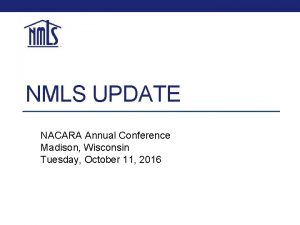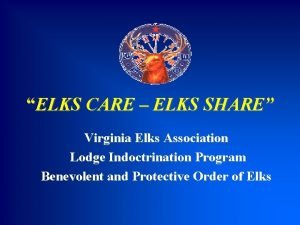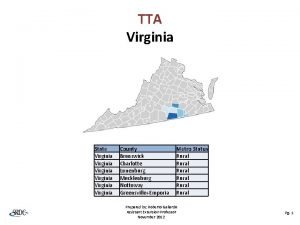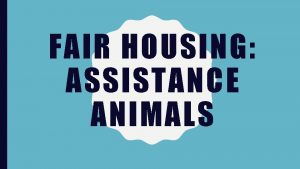Virginia Association of Housing Counselors 2019 Annual Spring























- Slides: 23

Virginia Association of Housing Counselors 2019 Annual Spring Conference Sheraton Virginia Beach Oceanfront April 29 – May 2, 2019 Housing Specialty – Rental Certification Counseling Exam Training Rental Delinquencies and Noncompliant Strategies

3 Main Reasons for Rental Delinquencies 1. Non-payment of Rent 2. Failure to comply with the Lease Agreement 3. Lack of Communication

Non-Payment of Rent When a Tenant fails to pay their monthly rent they are subject to the following procedures: 1. Five Day Quit Notice 2. Court Filing and Hearing Proceeding 3. Writ of Possession

Five Day Quit Notice Virginia landlords can give tenants a “pay or quit” notice. This notice allows the tenant five days to pay any late rent and associated fees or face the continuation of the eviction process in Virginia. If the tenant pays their rent within the five-day notice period, their tenancy will legally continue as if nothing has happened.

21/30 Notice If the tenant has violated a provision of the lease, they will be given a different notice. The notice period on this type of notice is known as a “ 21/30” notice. Example: let's say the tenant has a pet in a building that does not allow pets. The landlord serves them with a 21/30 notice on the 1 st of March. They will have 21 days to rehome the pet. If they do not re-home the pet by March 22 nd, their tenancy will end 30 days after the initial notice or March 31 st. It is much easier to negotiate with the landlord in this phase of the eviction process in Virginia than in later phases. Waiting until court papers have been filed makes it more expensive and difficult to negotiate.

Court Filing and Hearing Proceeding If a tenant does not vacate during the notice period, and fail to resolve any issues within the time period allotted, the landlord will go to the district courthouse and file an “unlawful detainer” lawsuit. This is the technical name for an eviction suit in the state of Virginia. The tenant will be served with a copy of the landlord's complaint, which specifies why they are being evicted, and a copy of the summons, which tells when your eviction hearing will be.

Court Filing and Hearing Proceeding (cont. ) A tenant is not required to attend the eviction hearing, but if fail to appear, the landlord will win the case automatically. The tenant may be able to win at an eviction hearing if the landlord has behaved improperly by violating the lease, discriminating against the tenant, or serving the tenant with improper notice. Tenants are advised to talk to a lawyer experienced in the eviction process in Virginia to better understand their rights and options.

Writ of Possession If the landlord wins the hearing (or if the tenant fails to appear), a court order will be granted which specifies the date in which the tenant must move. If the tenant fails to vacate the premises by that date, a writ of possession will be granted to the landlord. This writ, the final court document in the eviction process in Virginia, will be posted on the property to notify the tenant they have only 72 hours to leave or face forcible removal by the sheriff.

Writ of Possession (cont. ) If they are removed by the sheriff, they will have only 24 hours to call the sheriff's department and reclaim their belongings before they are considered abandoned property which can be sold or destroyed. See more at: http: //foreclosure. laws. com/evictionprocess-in-virginia#sthash. dx 187 dc 5. dpuf

Failure to Comply with Lease Agreement Advise clients to: Keep rented space and plumbing as clean and safe as conditions permit Use all utilities and appliances reasonably Get rid of trash Do not destroy or damage the property, or allow household members or guests to do so

Failure to Comply with Lease Agreement (cont. ) Do not disturb your neighbors, or allow household members or guest to do so Follow the lease and reasonable rules of your landlord Additional items may be added if properly agreed upon.

Lack of Communication Question: Is the tenant communicating with me? Communication is one of the most important factors landlord use in deciding whether or not to work with a delinquent tenant. If a landlord can not get in touch with a tenant who refuses to return calls, they are more likely to take on an “I am not going to waste my time” attitude and immediately move forward with an eviction.

Lack of Communication (cont. ) Once a tenant understands that it’s in his or her best interest to communicate with the landlord, they often return calls promptly. Question: Is the tenant doing what he/she said they would do? Perhaps one of the most important tests of whether or not to continue working with a tenant is one of follow through

Lack of Communication (cont. ) Example: If a landlord agrees to accept a late rent payment, it is very important that the tenant follow through with this agreement. If a tenant tells the landlord that the entire rent (plus late payment) will be paid on the 15 th of the month, but instead delivers only half of the payment, it is very likely that the landlord will start eviction proceedings.

Considerations Question: What kind of track record does this tenant have with the Landlord? * If the tenant is new to the property with no prior history, chances are the landlord is going to be more aggressive in their actions. It is the landlords belief that it is important to set a precedent early by sending a message to the tenant that paying late rent is not going to be tolerated.

Considerations (cont. ) If the tenant has a good payment history with the landlord, they may be more lenient if they believe it is an irregular occurrence. Question: Is this a one-time occurrence or is their current financial situation such that this is likely to be an ongoing problem? When the landlord communicates with the tenant, they may find that there is a significant material change to the tenants financial situation (i. e. lost job, uncollected child support, separation, etc. ). From a landlords perspective, it may appear that the tenant is going to have a hard time affording the rent going forward, it may be the landlords belief that it is best to begin working with the tenant towards an amicable move-out.

Considerations (cont. ) Question: Will the tenant be able to get caught up quickly or will this deficit be carried into the foreseeable future? It is a reality that most of the members of society lives paycheck to paycheck. Unforeseen financial hardships may present challenges to paying timely rent. With this kind of tenant, I have found that accepting the rent late this month typically means that the rent will be late next month as well. This is one reason why I may press a tenant very hard on exactly how they are going to get caught up, when they will have money, and where the money is going to come from.

Non-Compliance Notices Thirty Day Notice to Cure – 21/30 - is a form delivered by the landlord to the tenant for breaking their lease agreement. The violation can be for any material issue other than payment of rent. For the initial 21 days the tenant is allowed to correct the material noncompliance (such as a repair, too many guests, etc. ). If the violation has not been completed then the tenant will be forced to vacate the premises or have a forcible entry and detainer (FED).

Non-Compliance Notices Thirty-Day Unconditional Quit Notice - If the tenant violates the lease or rental agreement and the violation cannot be remedied (such as causing harm to other tenants or causing major damage to the rental unit), then the landlord can give the tenant a 30 day unconditional quit notice.

Non-Compliance Notices (cont. ) Five-Day Notice to Pay Rent or Quit - is used, in writing, when a tenant defaults in the payment of rent. The tenant will have 5 days after being served notice to remedy past due rent and all charges that encompass the breach. The notice requires the tenant to either make payment of rent or vacate the premises, giving possession back to the owner. Failure to remedy the payment and vacate will be deemed unlawful behavior and the landlord may an eviction through the courts.

Court Filing and Hearing Proceeding (cont. ) If and when an unlawful detainer action is filed, the landlord may go after the tenant seeking attorney’s fees and other court-related dues as part of the damages requested on an unlawful detainer action which may affect the tenant’s credit rating if unpaid. The legal theory is that the landlord alleges the tenant unlawfully continues to have use and possession of the rental property, and the landlord seeks the assistance of the court to have the tenant removed.

Writ of Possession (cont. ) A writ of possession is an order issued by a court of law which allows a person or group to take possession of real property by forcing the person or group currently in possession of the property out. It is commonly used after a landlord wins an eviction lawsuit against a tenant.

VAHC Questions
 Virginia school counseling association
Virginia school counseling association Nymhca
Nymhca Stfm abstract submission
Stfm abstract submission Nmls conference
Nmls conference Cfa annual 2019
Cfa annual 2019 Cic annual report 2019
Cic annual report 2019 Central virginia housing coalition
Central virginia housing coalition Kim ki duk spring summer fall winter
Kim ki duk spring summer fall winter Autumn is yellow winter is white
Autumn is yellow winter is white American psychiatric association annual meeting 2020
American psychiatric association annual meeting 2020 Travel health insurance association annual conference
Travel health insurance association annual conference Smart seo plugin joomla
Smart seo plugin joomla Virginia work area protection manual revision 2
Virginia work area protection manual revision 2 2019 virginia tech high school programming contest
2019 virginia tech high school programming contest Hillhead housing
Hillhead housing Supportive housing providers association
Supportive housing providers association Snug shared living
Snug shared living Forth housing number
Forth housing number Gardeen housing association
Gardeen housing association Spring creek association
Spring creek association Virginia health information management association
Virginia health information management association Elks care elks share
Elks care elks share Treasurers association of virginia
Treasurers association of virginia Virginia ready mixed concrete association
Virginia ready mixed concrete association











































